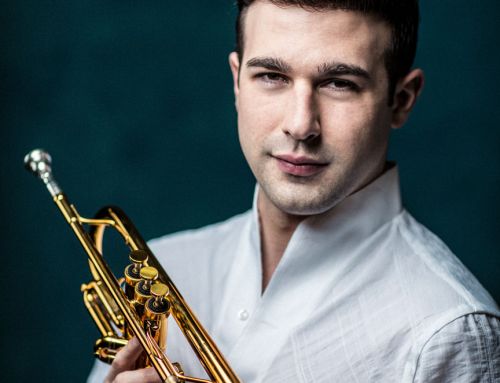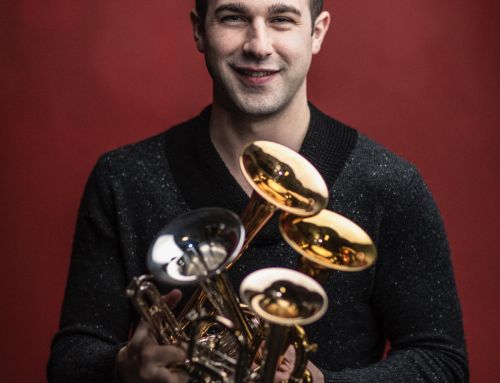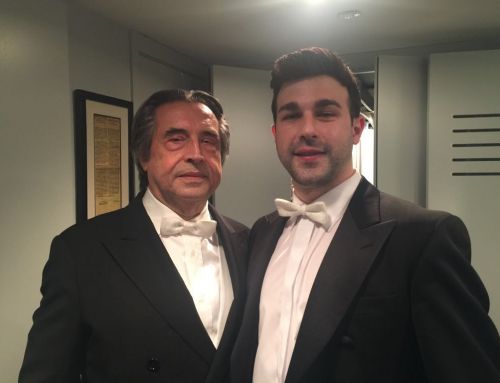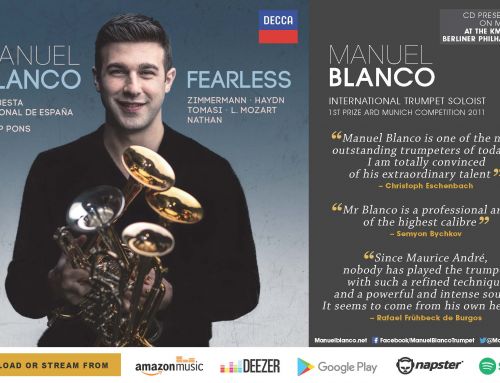MANUEL BLANCO AND LA JONDE: EMOTION
One of the most beautiful experiences of art is to hear a good concert of classical music. How many surprises, how many wonders and how difficult it seems to me that everything flows, that there is happiness in the interpretation, joy, synchrony, vitality, that ineffable magic that occurs when the instruments, and their performers, speak to each other and they dissolve, note by note, the complexity of a score, its variations, its details! This morning I have been listening to the JONDE (Joven Orquesta Nacional de España) under the direction of George Pehlivanian: it was a special concert, the Mozart hall of the Zaragoza Auditorium was crowded, the oldest listener was perhaps a 94-year-old man, perfectly lucid, who would tell me that during the performance of Manuel Blanco, on the trumpet, he had been deeply moved. So much so he had to hold back the tears.
The JONDE, with the soloist Blanco (Daimiel, Ciudad Real, 1985), who played two songs in the first part, one from Arutianian and the other from Piazzola, achieved a splendid first part; Blanco, barely thirty years old, said that he had started in a certain way in the Auditorium of Zaragoza twelve or thirteen years ago, and that today’s one was a very special concert. Listening to solo instruments, in the middle of the orchestra or when the orchestra stops or chooses the sound of the string or other winds, produces a special sensation: you hear sounds that you didn’t think the instrument had. He played as he wished, melancholy and exuberant, warm and sure, with swing, he seemed to animate the orchestra in his dead time and enjoyed the director’s movements. A beautiful moment. Manuel Blanco is elegant, classic and modern, he knows his instrument and feels so tasteful that he transmits his joy, the pure pleasure of playing. And not only that: he knows that music is made as a team and praised and encouraged his classmates.
And then the JONDE attacked Shostakovich’s four-stroke’ Leningrad’ symphony, one of those difficult, varied works, full of nuances, balances and imbalances, entrances and exits, recesses and echoes; Juan Carlos Galtier exalted the composer’s virtues and asked us to pay attention to his irony, one of his constants. That’s harder for me to perceive, at least. But what we do hear, hear and see is the richness of the score, the moods, the creation of atmospheres, the beauty and strength, and that amazing intensity that constitutes the closing (also there was in another two or three moments) in all heights, with the whole block of shaken musicians, as if it were an authentic catharsis or apotheosis. The piece lasted more than 70 minutes. And the young people, aged 17 to 25, embroidered it.
People shouted “bravos” and more “bravos” for more than five minutes. Miguel Ángel Tapia, pianist and conductor of the Auditorium, said that there were more young people than ever before and that perhaps there were people from outside. The Introduction to Music Cycles were an invention of the weeping Angel Martinez 36 years ago; Tapia has been coordinating them for 35 years. Next to me sat a couple of friends of Manuel Blanco, to whom he dedicated his concert. The children, happy, hugged each other in front of almost two thousand people who suspected that he had had an unforgettable morning. Music conveys fullness, emotion, tranquility, and that is one of its enigmas. The hidden melody that envelops us. The throbbing joy.
Source: antoncastro





